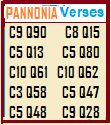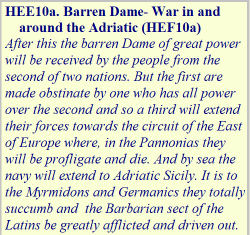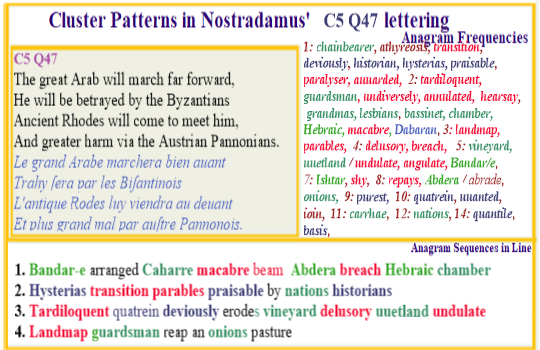 Analyses of all verses
Analyses of all verses
|
 Web Site
Web Site |
 All
Sefirots All
Sefirots |
Nostradamus C5 Q47: An Arabian defeat seen through the eyes of a 21st century hisorian.
Copyright: Allan Webber, December 2015 Mar 2023

 In this verse the text serves the purpose of relating the
broad outline of a battle in which Arab nations suffer a major loss. In so doing
it uses terms that link into the Barren Lady story line.
In this verse the text serves the purpose of relating the
broad outline of a battle in which Arab nations suffer a major loss. In so doing
it uses terms that link into the Barren Lady story line.
Pivotal in this link is the mention in the end of the verses's text of Austrians and Pannonians since these are prominent ciphers in the quotes covering that same story line .
At the same time it also shares terms such as Byzantians with many verses in this series. The same is true of the great Arab engaged in a conflict that is mentioned in the first line of text. These connections reinforce that this verse relates to various parts of the Barren Lady's family and their wars since the shared items lead directly to that family. But the link to Byzantium also hints at a long lived regime about to come to an end through its recent failures to adapt to change.
The anagrams give us more detail of the battlegound but it is delivered through the eyes of a historian who is a co-agent in Nostradamus construction of his prophecies. That agent was not of Nostradamus' era but of a time yet to happen.
We know of his input due to Nostradamus wording in the third and fourth lines of C1 Q02; 'A voice, fear: he trembles in his robes. Divine Splendour, The God sits nearby'. That recognition of an outside agent also appears throughout his 1555 Preface to Cesar. For example in on part of the preface he says 'it is by means of an Angelic spirit that the man prophesying is inspired. '
 Through their vision we know that the battle is fought in a
uuetland (u
deuant L) surrounded by a
vineyard
(y viendra) and
an_onion_pasture
(auſtre P_an_nonoi).
Through their vision we know that the battle is fought in a
uuetland (u
deuant L) surrounded by a
vineyard
(y viendra) and
an_onion_pasture
(auſtre P_an_nonoi).
The blame for the loss according to an historian (inois Trah) is due to a nations_hysteria's (ſantino_is Trahy ſe) whipped up by a tardiloquent (t L'antique Rod) guardsman's (us grand ma) hearsay (ahy ſera) about parables (a par les B).
Other anagrams tell us the location of this battle is around the region of Bandar-e
on the coast of the Persian Gulf and Abdera (Thrace); a city on the northern coast of the Adriatic Sea.